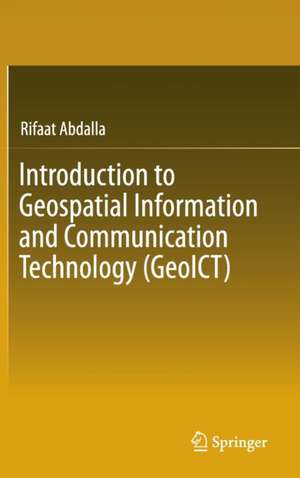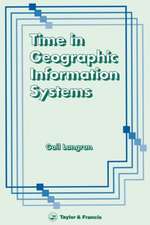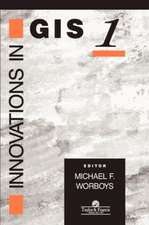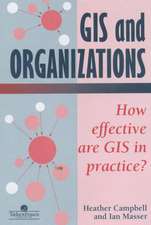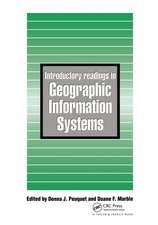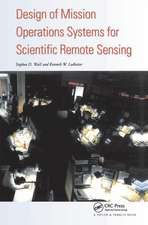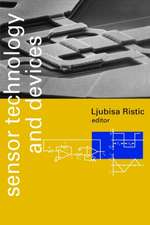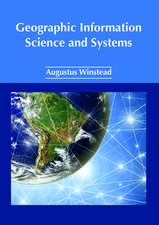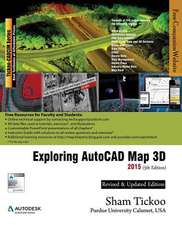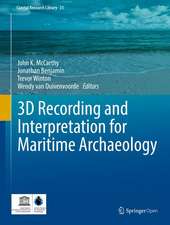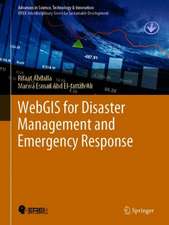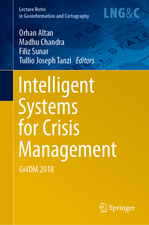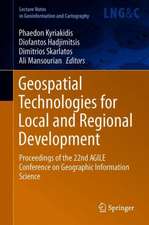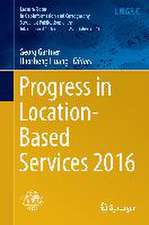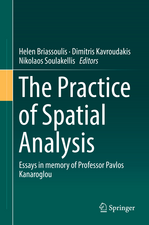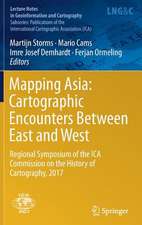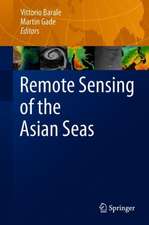Introduction to Geospatial Information and Communication Technology (GeoICT)
Autor Rifaat Abdallaen Limba Engleză Hardback – 3 aug 2016
| Toate formatele și edițiile | Preț | Express |
|---|---|---|
| Paperback (1) | 634.68 lei 6-8 săpt. | |
| Springer International Publishing – 30 mai 2018 | 634.68 lei 6-8 săpt. | |
| Hardback (1) | 640.88 lei 6-8 săpt. | |
| Springer International Publishing – 3 aug 2016 | 640.88 lei 6-8 săpt. |
Preț: 640.88 lei
Preț vechi: 753.97 lei
-15% Nou
Puncte Express: 961
Preț estimativ în valută:
122.63€ • 133.63$ • 103.34£
122.63€ • 133.63$ • 103.34£
Carte tipărită la comandă
Livrare economică 23 aprilie-07 mai
Preluare comenzi: 021 569.72.76
Specificații
ISBN-13: 9783319336022
ISBN-10: 3319336029
Pagini: 241
Ilustrații: XXIII, 153 p. 54 illus. in color.
Dimensiuni: 155 x 235 x 11 mm
Greutate: 0.43 kg
Ediția:1st ed. 2016
Editura: Springer International Publishing
Colecția Springer
Locul publicării:Cham, Switzerland
ISBN-10: 3319336029
Pagini: 241
Ilustrații: XXIII, 153 p. 54 illus. in color.
Dimensiuni: 155 x 235 x 11 mm
Greutate: 0.43 kg
Ediția:1st ed. 2016
Editura: Springer International Publishing
Colecția Springer
Locul publicării:Cham, Switzerland
Cuprins
Geospatial Information Technology.- Spatial Positioning Technology.- Networking and Web Services.- Distributed GIS Technology.- Mobile GIS and Location Based Services (LBS).- Geospatial Data Integration.- GeoICT Standards.
Notă biografică
Dr. Rifaat Abdalla is Associate Professor of Geospatial Science with King Abdulaziz University, Jeddah. During the past ten years, he served as Defence Scientist with Defence Research and Development Canada; the Federal Government of Canada research arm in Defense and Security research. In addition he was Adjunct Professor with the graduate program in Disaster and Emergency Management, York University, Toronto, he also served as a contract faculty with the Geomatics Program, Ryerson University, Toronto. Dr. Abdalla received his Ph.D. from the Centre for Research in Earth and Space Science, York University in 2006, specialized in Web-based GIS Applications. He received his Masters in Environmental Systems Engineering, from the University of Regina, focusing on GIS and Remote Sensing Applications. Dr. Abdalla has published extensively in the field of Web-based GIS for Disaster Management and has received many recognitions and awards, including the 2007 ESRI Best Scientific Paper, presented by the American Society for Photogrammetry and Remote Sensing (ASPRS) for papers published in Photogrammetric Engineering and Remote Sensing Journal. Also, he is a recipient of the Natural Science and Engineering Research Council of Canada (NSERC) Ph.D. Scholarship and Post-doctoral Fellowship, Ontario Graduate Scholarship for Science and Technology Scholarship and the Best Paper Award of 2009 Conference on Geo-Web Services, held in Cancun, Mexico.
Textul de pe ultima copertă
This book is designed to help students and researchers understand the latest research and development trends in the domain of geospatial information and communication (GeoICT) technologies. Accordingly, it covers the fundamentals of geospatial information systems, spatial positioning technologies, and networking and mobile communications, with a focus on OGC and OGC standards, Internet GIS, and location-based services. Particular emphasis is placed on introducing GeoICT as an integrated technology that effectively bridges various information-technology domains.
Caracteristici
Broadens understanding of the components and foundations of Geospatial Information and Communication Technology (GeoICT) from academic, professional and research perspectives Simplifies a complicated picture in one of the fast growing technologies used by expanding user community Explains how to link between Web Mapping Standards, traditional GIS Systems, Spatial Positioning Systems and Information Technology Applications Equips readers to handle complex concepts of GeoICT Systems, their architectures, capabilities and limitations Includes supplementary material: sn.pub/extras
